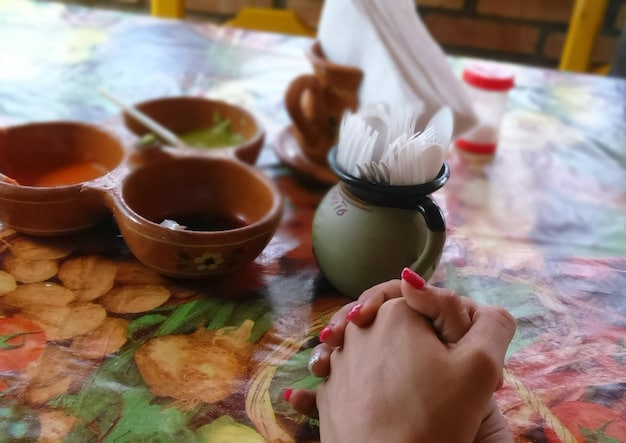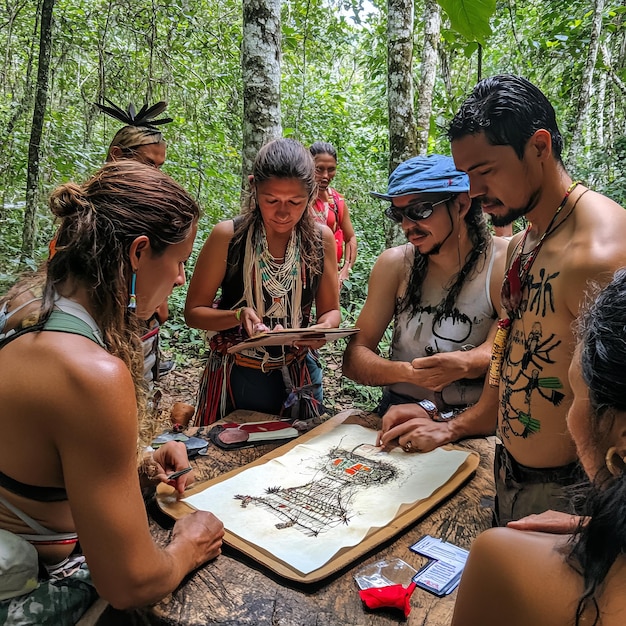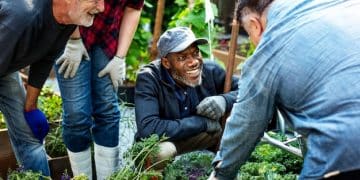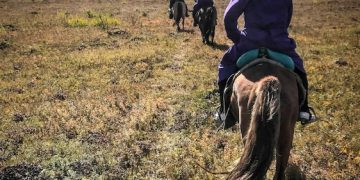Supporting Indigenous Communities: An Authentic US Travel Guide

Supporting Indigenous communities through travel offers authentic US experiences that respect and preserve cultural heritage, providing economic benefits and fostering cross-cultural understanding for a more ethical and enriching travel experience.
Embark on a journey that not only enriches your travel experiences but also contributes to supporting Indigenous communities through travel in the United States. Discover how to engage in authentic cultural immersion that benefits these communities directly, fostering respect and preservation of their heritage.
Discovering Ethical Travel: Supporting Indigenous Communities
Ethical travel is more than just a trend; it’s a responsibility. When we talk about traveling within the United States, it’s crucial to recognize the importance of respecting and supporting Indigenous communities through travel. This involves making informed decisions that ensure our visits contribute positively to their well-being and cultural preservation.
Understanding Indigenous Cultures
Before planning any trip, it’s vital to research and understand the cultures of the Indigenous communities you plan to visit. Each nation has its own unique traditions, customs, and protocols. Respecting these differences is the foundation of ethical engagement.
The Impact of Tourism
Tourism can have both positive and negative effects on Indigenous communities. While it can bring economic opportunities, it can also lead to cultural exploitation and environmental degradation. By choosing responsible travel options, we can minimize the negative impacts and maximize the benefits.
- Engage in tours and activities operated by Indigenous-owned businesses.
- Purchase authentic crafts and artwork directly from Indigenous artisans.
- Respect sacred sites and cultural protocols.
- Educate yourself and others about Indigenous history and contemporary issues.

By focusing on ethical practices, supporting Indigenous-owned businesses, and being mindful of cultural sensitivities, travelers can play a crucial role in preserving and promoting the rich heritage of Indigenous communities while enjoying authentic and meaningful experiences.
Planning Your Trip: Respecting Protocols
Before you even pack your bags, it’s important to thoroughly plan your trip. This isn’t just about finding the best deals; it involves learning about and respecting the protocols of the Indigenous communities you’ll be visiting. This proactive approach ensures your travel is both respectful and enriching.
Researching Tribal Nations
Each tribal nation has its own government, laws, and cultural norms. Before visiting, research the specific protocols of the nation you plan to visit. This could include rules about photography, dress codes, or behavior at sacred sites.
Seeking Permission
In some cases, you may need to seek permission to visit certain areas or participate in specific activities. Always check with the tribal government or tourism office to ensure you have the necessary permits and authorizations. Respecting the boundaries is paramount.
- Contact tribal authorities in advance to inquire about appropriate etiquette.
- Obtain necessary permits for activities like hiking or camping.
- Respect any restrictions on photography or recording.
- Participate in cultural orientations or briefings when available.
Planning your trip with respect for Indigenous protocols ensures that you are not only a welcome guest but also a responsible traveler who contributes positively to the community’s well-being and cultural preservation.
Authentic Experiences: Immersing in Indigenous Culture
The heart of supporting Indigenous communities through travel lies in authentic experiences. These are the moments when you truly connect with the culture, learn from the people, and gain a deeper understanding of their way of life. Seek opportunities that are genuine, respectful, and directly beneficial to the community.
Staying at Indigenous-Owned Accommodations
Choosing to stay at accommodations owned and operated by Indigenous people is a direct way to support their economy. These establishments often offer unique cultural experiences and insights into local traditions. This also ensures that your money directly benefits the community.
Participating in Cultural Tours
Cultural tours led by Indigenous guides provide invaluable perspectives on history, traditions, and contemporary issues. These tours are not only informative but also help to preserve and promote cultural heritage. Engage actively and ask thoughtful questions for a more meaningful experience.

Immersing yourself in the culture through carefully curated experiences creates a deeper connection and shows genuine respect, ensuring your travel benefits the people and contributes to cultural preservation.
Economic Empowerment: Supporting Indigenous Businesses
One of the most impactful ways to support Indigenous communities through travel is through economic empowerment. By intentionally spending your money with Indigenous-owned businesses, you directly contribute to their self-sufficiency and sustainability. This form of support has a tangible and lasting effect.
Purchasing Authentic Products
When buying souvenirs or gifts, seek out authentic products made by Indigenous artisans. Avoid mass-produced items that imitate Indigenous designs but don’t benefit the creators. Look for certifications or labels that guarantee authenticity and fair trade practices.
Dining at Indigenous Restaurants
Experiencing the local cuisine is an integral part of any travel experience. When possible, dine at restaurants owned and operated by Indigenous people. This not only supports their businesses but also offers a taste of their unique culinary traditions.
Supporting Indigenous-owned businesses ensures that your travel dollars directly benefit the community, fostering economic independence and cultural preservation.
Environmental Stewardship: Respecting the Land
Indigenous cultures often have a deep connection to the land, viewing it as sacred and essential to their way of life. As travelers, we must adopt a similar respect for the environment and strive to minimize our impact. Practicing environmental stewardship is a key aspect of supporting Indigenous communities through travel.
Following Leave No Trace Principles
Whether hiking, camping, or exploring natural areas, adhere to Leave No Trace principles. This includes packing out all trash, staying on designated trails, and avoiding disturbing vegetation or wildlife. Minimizing your footprint helps preserve the natural beauty for future generations.
Supporting Conservation Efforts
Many Indigenous communities are actively involved in conservation efforts to protect their ancestral lands. Consider supporting these initiatives through donations or volunteer work. By contributing to conservation, you help ensure the long-term sustainability of the environment and the cultural heritage it supports.
- Participate in community clean-up events.
- Respect water sources and avoid polluting waterways.
- Support sustainable tourism practices.
- Learn about local environmental challenges and how you can help.
By respecting the land and supporting conservation efforts, travelers play a crucial role in preserving the natural environment that is integral to Indigenous cultures and livelihoods. This respect ensures that future generations can continue to enjoy the beauty and resources of these areas.
Education and Advocacy: Spreading Awareness
Beyond direct economic support and environmental stewardship, education and advocacy are powerful tools for supporting Indigenous communities through travel. By learning about their history, contemporary issues, and cultural heritage, you can become an informed advocate for their rights and well-being. Sharing this knowledge with others can amplify the impact of your travel experiences.
Learning About History
Understanding the historical context of Indigenous communities, including past injustices and ongoing challenges, is essential for fostering empathy and respect. Seek out resources that provide accurate and nuanced accounts of Indigenous history, rather than relying on stereotypes or incomplete narratives.
Supporting Indigenous Voices
Amplify Indigenous voices by sharing their stories, perspectives, and creative works. Follow Indigenous artists, writers, and activists on social media. Attend presentations or workshops led by Indigenous speakers. By ensuring their voices are heard, you can help to counter misinformation and promote a more accurate understanding of Indigenous cultures.
Education and advocacy are vital components of responsible travel, ensuring that the stories, rights, and well-being of Indigenous communities are recognized and respected.
| Key Point | Brief Description |
|---|---|
| 🤝 Cultural Immersion | Engage in respectful cultural experiences. |
| 💰 Economic Support | Support Indigenous-owned businesses and artisans. |
| 🌱 Environmental Respect | Practice sustainable travel and respect the land. |
| 📚 Education & Advocacy | Learn and share awareness about Indigenous cultures. |
Frequently Asked Questions
▼
Supporting Indigenous communities through travel promotes cultural preservation, economic empowerment, and responsible tourism, ensuring that these communities benefit directly from your visit while maintaining their heritage.
▼
Look for tours and accommodations operated by Indigenous-owned businesses, certified by tribal organizations. Engage in activities that actively involve and benefit the community, ensuring respectful cultural exchange.
▼
Research the specific customs and traditions of the community you are visiting. Seek permission before taking photos or participating in ceremonies, and always adhere to local guidelines regarding sacred sites.
▼
Avoid activities that exploit or misrepresent Indigenous cultures. Purchase authentic crafts directly from artisans and be mindful of the environmental impact of your visit, supporting sustainable practices.
▼
Stay informed about Indigenous issues, advocate for their rights, and support organizations that promote their well-being. Share your experiences and encourage others to travel responsibly and respectfully.
Conclusion
Supporting Indigenous communities through travel is an enriching way to experience the United States while contributing to the preservation of cultural heritage and fostering economic empowerment. By being mindful, respectful, and informed, we can ensure that our travels benefit these communities and promote a more sustainable and equitable future for all.





